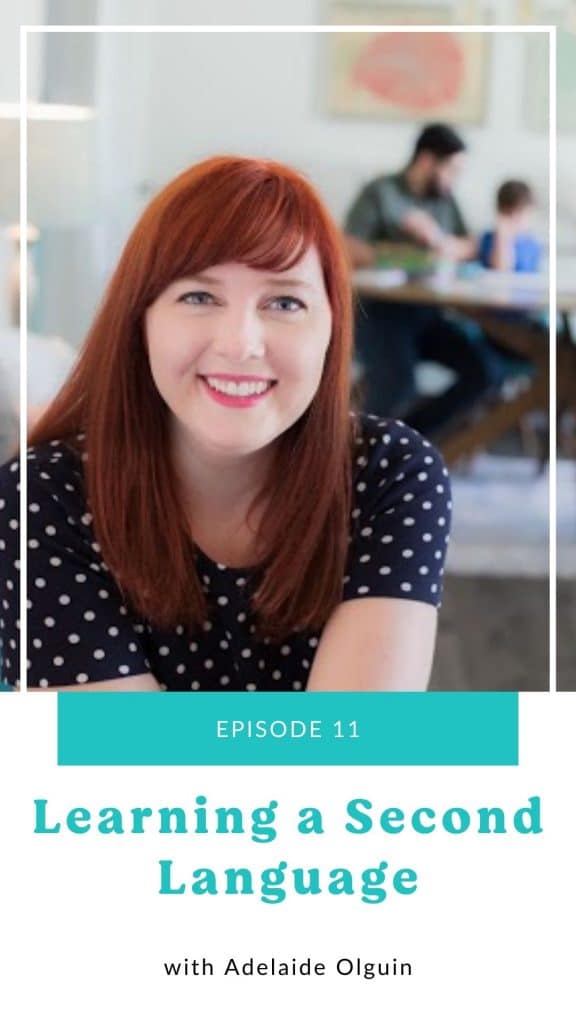11: Learning a Second Language as a Family
Learn about the language-learning program for families called Talkbox.mom, where you can start speaking a foreign language as a family from day 1. Adelaide explains why she started this company and about all the benefits of learning a second language, no matter your age.

Table of contents
- Why did you want to learn a second language?
- Why should people and families want to learn a second language?
- What are some benefits that have come from learning another language?
- When should we start teaching our kids a foreign language?
- What is your advice for moms to help reluctant learners?
- Other episodes you may like
- Listen to this episode
- Show Notes links
Why did you want to learn a second language?
Adelaide grew up in a monolingual home, but she interacted with native Korean speakers at school. While she helped them learn she English, she in turn learned some basic Korean vocabulary and was able to pick up on some body language. When she took Spanish in high school, Adelaide passed her tests, but she couldn’t actually speak it with native Spanish speakers.
After she had her first son she decided to speak German in the home, as she had learned German while working in the fashion industry. But she soon realized that even though she could run a meeting in German, she didn’t know the vocabulary needed as a mom.
When Adelaide and her family moved to Brazil, she bought a German grammar and vocabulary textbook, but it was difficult to engage her kids. As her oldest son said, “We didn’t come to Brazil to sit in a room.” In order to truly learn the language, Adelaide realized she needed to follow the model for how she learned English—through speaking and listening before reading and writing.
Why should people and families want to learn a second language?
“It is hard to be international and have so much anxiety in the grocery store and not being able to talk. And so with that in mind, I made talkbox.mom, but also families who are in the United States want their kids to have all these opportunities that knowing a foreign language gives them.”
What are some benefits that have come from learning another language?
We all live in a global community, and learning another language opens the world to so many more educational, industrial, and social opportunities.
“When you can really speak someone’s language, it just changes your relationship and you’re able to understand them more and make that connection.”
As Adelaide has been teaching her kids foreign languages, she has seen how the process helps to increase her children’s attention span and helps them to think more logically than emotionally, even from a young age. The same part of the brain that governs language learning is also used to learn math, which is like another language.
Learning another language also helps broaden your vocabulary of your native language. It allows families to discuss how the languages are similar and different to each other. These connections and critical thinking skills help children when they take ACTs, SATs, or other similar knowledge assessments.
Most importantly, knowing another language helps people connect with their family, community, and people they meet while traveling. This increased communication provides more opportunities to do good in the world, which is the ultimate goal.
When should we start teaching our kids a foreign language?
The younger a child is when they start learning a foreign language, the quicker they’ll learn it. But that doesn’t mean older kids (and parents too!) can’t start learning whenever it’s possible. Through practice and repetition, our brains are designed to learn and will adapt to the language.
What is your advice for moms to help reluctant learners?
First and foremost: keep it fun! The excitement and enthusiasm parents bring to learning another language will be contagious to the children. Another way to encourage kids to keep trying and learning is to have clear expectations. It can be tempting to expect perfection too soon, but that will only serve to discourage the kids.
Another way to foster a safe learning environment for kids is to focus on the use and repetition of language over the exact pronunciation. Instructors often say “No, that’s not right, it’s pronounced ‘x’,” when that’s not how we learn our first language.
Celebrate the victories! It’s an important milestone when a child says their first word, so keep that positive energy when learning a foreign language, too.
Happy adventuring!
Other episodes you may like

Listen to this episode
Show Notes links
Adelaide’s bio:
Adelaide Olguin will help you create a homeschool experience that makes your heart beat with excitement, has your kids going on and on about what they’re learning, and silences the doubters, including that little voice in your head, whispering that you aren’t enough to homeschool your kids.
She wants your homeschool to be better than any other option out there. Language immersion program. Check. Traveling the world while you homeschool. Check. Focusing on what will actually help your child to be a successful adult. Double check.
She is the creator of TalkBox.Mom, which has families talking in a foreign language the same day they start, and the host of the podcast the Foreign Language and Travel Homeschool. But the most important part of her day is homeschooling her boys.
talkbox.mom/#languageselection → JONESINFORTASTE code for $20 off first box and book, and JONESINFORTASTEBOOK code for $5 off just the book
Here are the social media channels for people to connect with TalkBox.Mom
Facebook: TalkBox.Mom
Instagram: @talkboxmom
YouTube: TalkBoxMom
